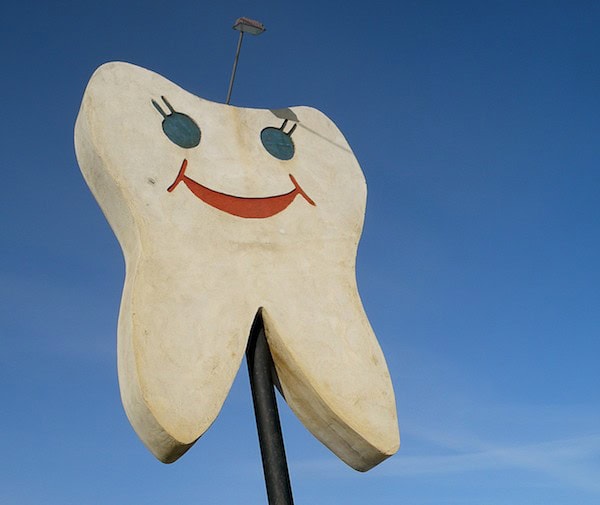
[Image above] Credit: luke siemens; Flickr CC BY-NC 2.0
Tooth sensitivity is a sensitive issue for many of us. Up to 57% of adults experience tooth sensitivity, according to oral care experts at Colgate.
If you’re one of the majority who curse at the pain and discomfort that comes from sipping hot tea or biting into an ice cream cone, blame the insufficiency of your tooth enamel.
That hard protective layer on the tooth surface can wear away, a process that exposes the tooth’s middle layer, dentin. Dentin is composed of tiny tubule structures that project inwards directly towards the nerve—yowza.
Those dentinal tubules that provide a direct pipeline for pain also make a nice thoroughfare for bacteria, irritants, and other stuff, putting sensitive teeth at risk of dental disease and frequent dentist visits, too.
While products aimed at sensitivity sufferers do provide relief by blocking the tubule openings, these products provide temporary protection—when users discontinue use, the tubules once again open up, letting the pain begin anew.
According to a new paper published in ACS Nano (more about the paper itself to follow below):
“Recently, a number of commercial dental care products for daily use (such as Sensodyne Prophylaxis Paste with NovaMin and Colgate Sensitive Pro-Relief Toothpaste) were developed to occlude exposed dentinal tubules. Unfortunately, the precipitates from these commercial products only penetrate into the dentinal tubules approximately 2–10 μm, which may not combat the daily adverse conditions in the oral environment, such as erosion and tooth wear, resulting from chewing, brushing, and mechanical force. If the precipitates do not penetrate into the dentinal tubules deep enough, they would soon be worn out.”

Credit: Shelley N.; Flickr CC BY-NC-ND 2.0
As former editor Peter Wray has attested on Ceramic Tech Today before, products like Sensodyne Repair and Protect can provide relief to sensitivity sufferers—although only if you avoid the U.S. version of the product, which is strangely sans bioglass. Smuggling European versions of the toothpaste may not be necessary forever, however, if a new biomaterial continues the success it has seen in experiments so far.
A team led by researchers at National Taiwan University generated and tested a gelatin-templated mesoporous silica biomaterial that shows good biocompatibility and deeper penetration of dentin tubules with biomimetic crystals.
The team developed a paste of the silica biomaterial that also contains phosphoric acid, the inclusion of which releases nanoparticles of calcium carbonate. The nanoparticles then secrete calcium and phosphate-containing ions, which can penetrate the thin dentin tubules and crystallize to form an effective barrier on the tooth.
The paper says that the paste “almost completely occludes dentinal tubules within 10 min through the formation of an intact biomimetic Ca–P protective barrier at the surface of the tubules.” The team measured the tubule plugs persisting down to 40 μm, much deeper than products like Sensodyne can accomplish.
According to the paper’s abstract, in vitro and in vivo testing (in dogs) showed that their material formed dicalcium phosphate dihydrate, tricalcium phosphate, and hydroxyapatite crystals within the tubules.
We’ll have to continue to watch this story to see how the material fares in human teeth, although the authors already note that it’s harder to crystallize in dog dentin tubules than human tubules (due to higher hydrostatic pressure in dog tubules).
The paper is “A mesoporous silica biomaterial for dental biomimetic crystallization” (DOI: 10.1021/nn5053487).
Author
April Gocha
CTT Categories
- Biomaterials & Medical
- Glass
- Material Innovations


